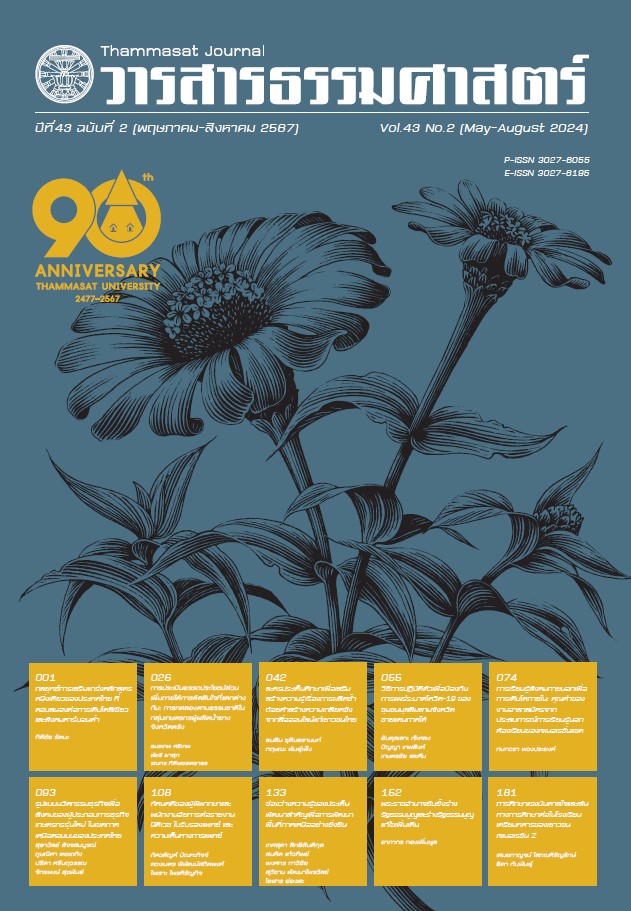Practices for COVID-19 Prevention of Muslim Communities in Three Southern Border Provinces
Main Article Content
Abstract
This qualitative study aimed to examine the practices to prevent COVID-19 among Muslim communities in three southern border provinces. Purposive sampling was used for participant selection. Data were collected through documentation, in-depth interviews, and observation in three communities: 1) communities in Mueang district, Pattani province; 2) communities adjacent to the Malaysia border, specifically communities in Su-ngai Kolok district, and 3) communities in Waeng district, Narathiwat province. Data triangulation was conducted to validate the data. The data were analyzed, concluded, and presented through descriptive analysis. The study found that the practices of Muslim communities in three southern border provinces for preventing COVID-19 included maintaining physical distancing with others in both normal and critical situation, wearing facial masks in public more often than within households due to community-based communication processes, and regularly washing hands, especially after visiting high-risk areas. Additionally it was noted that Muslim community believes that taking a bath is a practice to prevent the spreading of COVID-19 as well as a religious practice before prayer. The communities also reduced physical contact between individuals in both public and household areas and boosted immunity by taking herbal medicines, exercising, and getting vaccinated.
Article Details
References
กรมการแพทย์แผนไทยและการแพทย์ทางเลือก. (2564, 27 กรกฎาคม). ข้อเท็จจริงของใบกระท่อมต้านโควิด-19 ได้จริงหรือไม่. Hfocus เจาะลึกระบบสุขภาพ. (ออนไลน์). https://www.hfocus.org/content/2021/07/22437.
ขวัญชัย วิศิษฐานนท์. (2564, 25 สิงหาคม). กรมการแพทย์แผนไทยชูสมุนไพรเพิ่มภูมิต้านทานให้ร่างกายแข็งแรงตามศาสตร์ภูมิปัญญาการแพทย์แผนไทย ในสถานการณ์โควิด 19. กรมการแพทย์แผนไทยและการแพทย์ทางเลือก. https://www.dtam.moph.go.th/images/dtam_news/dn0046-25082564.pdf.
ดิเรก หมานมานะ, มูฮัมหมัดรอฟีอี มูซอ และพะเยาว์ ละกะเต็บ. (2563). สถานการณ์และแนวทางการพัฒนาเยาวชนมุสลิมในพื้นที่ 3 จังหวัดชายแดนภาคใต้. วารสารสังคมศาสตร์. 9(1), 40-49
ทิมภ์พร วิทูธพงศ์. (2564). เชียร์ฟุตบอลแบบ New Normal ลดเสี่ยงโควิด-19. โรงพยาบาลจุฬาลงกรณ์สภากาชาดไทย.https://chulalongkornhospital.go.th/kcmh/line/%e0%b9%80%e0%b8%8a%e0%b8%b5%e0%b8%a2%e0%b8%a3%e0%b9%8c%e0%b8%9f%e0%b8%b8%e0%b8%95%e0%b8%9a%e0%b8%ad%e0%b8%a5%e0%b9%81%e0%b8%9a%e0%b8%9a-new-norma%e0%b8%a5%e0%b8%94%e0%b9%80%e0%b8%aa%e0%b8%b5%e0%b9%88/.
นิชชิมา ทนศิริ. (2551). ผลของการให้คำปรึกษาแบบกลุ่มตามแนวทฤษฎีเผชิญความจริงต่อการปรับตัวทางสังคมของนักเรียนวัยรุ่น. [วิทยานิพนธ์ วิทยาศาสตรมหาบัณฑิต]. มหาวิทยาลัยบูรพา.
วิทยา วันเพ็ญ. (2564, 15 พฤษภาคม). คู่มือฉีดวัคซีนโควิด-19 และข้อปฏิบัติก่อนหลังฉีดวัคซีน. กรุงเทพธุรกิจ. https://www.bangkokbiznews.com/lifestyle/lifestyle_art-living/938220.
ศูนย์ข้อมูลโควิด 19 และการพัฒนาที่ยั่งยืนชายแดนภาคใต้. (2564). ทัศนคติต่อวัคซีนและความตั้งใจในการฉีดวัคซีนป้องกันโรคโควิด-19 ของประชาชนในพื้นที่สามจังหวัดชายแดนภาคใต้. คณะพยาบาลศาสตร์ มหาวิทยาลัยสงขลานครินทร์ วิทยาเขตปัตตานี. https://nurmis-center.pn.psu.ac.th/covid19/phpactimage/pr013_2.php.
สมเด็จพระพุทธโฆษาจารย์ (ป.อ.ปยุตฺโต). (2561). การพัฒนาที่ยั่งยืน. พิมพ์ครั้งที่ 21-ธรรมทานเพื่อการศึกษาธรรม. นครปฐม: สำนักพิมพ์มูลนิธิโกมลคีมทอง.
อภิวัฒน์ รัตนวราหะ. (2563). อนาคตศึกษา. พิมพ์ครั้งที่ 2. เชียงใหม่: หจก.ล๊อคอินดีไซน์เวิร์ค.
อัญชลี จันทาโภ และวิศนี ศิลตระกูล. (2561). ธรรมชาติผู้เรียนทางการศึกษานอกระบบ. [เอกสารที่ไม่มีการตีพิมพ์]. หลักการเรียนรู้และเทคนิคการฝึกอมรม มหาวิทยาลัยสุโขทัยธรรมาธิราช.
อิสมาอีลลุตฟี จะปะกียา. (2563) คู่มือเผชิญโรคระบาด: คำแนะนำเนื่องในวิกฤติการแพร่ระบาดของโรคติดต่อเชื้อไวรัสโคโรนา 2019. สถาบันอัสสลาม. ปัตตานี: มหาวิทยาลัยฟาฎอนี.
อีสมาแอ กาเต๊ะ. (2561) วะสะฎียะฮฺในอิสลามกับการอยู่ร่วมกันท่ามกลางสังคมพหุวัฒนธรรม ด้านความเชื่อ และความคิด. Journal of Islamic Studies, Prince of Songkla University. 9(1), 31-48.
Adam Kucharski. (2563). The Rules of Contagion. [ระเบียบแห่งการระบาด]. (กิตติศักดิ์ โถวสมบัติ, ผู้แปล). กรุงเทพฯ: ไอดีออลดิจิตอลพรินท์.
European Union. (2564, 5 พฤษภาคม). มุสลิมทั่วโลกกับการรับวัคซีน COVID-19 ในเดือนรอมาฎอน. https://nurmis-center.pn.psu.ac.th/covid19/file/art1_1.pdf
Fareed Zakaria. (2564). Ten Lessons for a Post-Pandemic World. [บทเรียนเพื่อโลกหลังการระบาด]. (วิภัชภาค, ผู้แปล; พิมพ์ครั้งที่ 2). กรุงเทพฯ: มติชน.
WHO Thailand. (2020). คำแนะนำการสวมหน้ากากอนามัยทางการแพทย์สำหรับชุุมชน (ในเคหะสถานและสถานบริการสุุขภาพ) ในบริบทของช่วงการเกิดการระบาดของไวรัสโคโรน่าสายพันธุ์ใหม่ (2019-nCoV). https://cdn.who.int/media/docs/default-source/searo/thailand/advice-on-the-use-of-masks-thai-final.pdf?sfvrsn=81cac668_0
Al-Jayyousi O.R. (2012). Islam and Sustainable Development: New Worldviews. New York: Gower Publishing.
Bronfenbrenner, U. (1977). Toward an experimental ecology of human development. American Psychologist, 32(7), 513-531.
Heidegger M. (1962). Being and Time (MacQuaeeie J. & Robinson E trans). New York: Harper & Row.
Shaik Abdullah H.M. (2015). Manusia daripada Perspektif Islam. A and S Cetak, Selangor Darul Ehsan; Malaysia. p.15.

